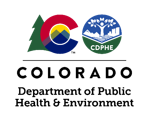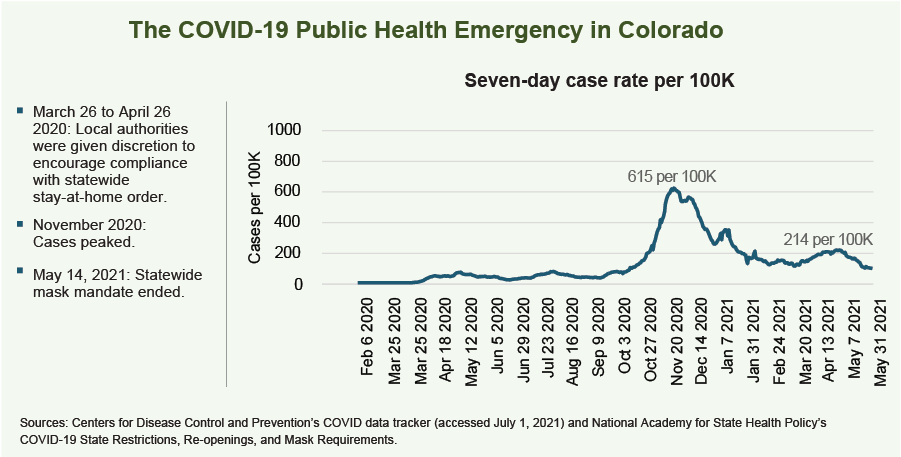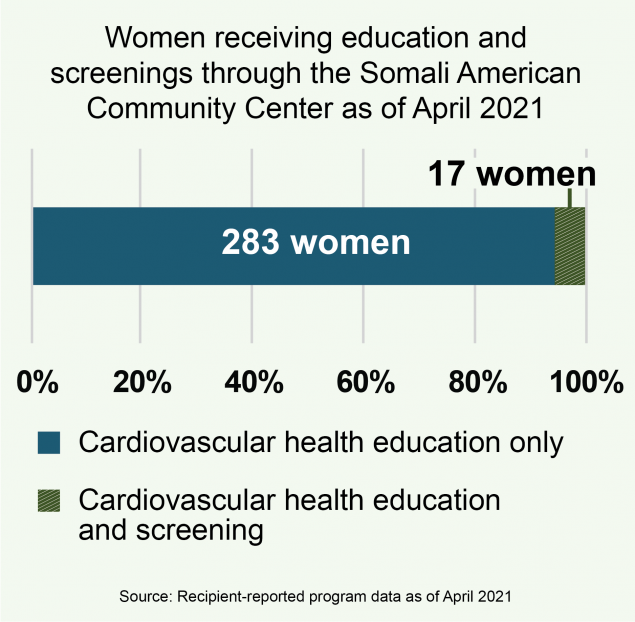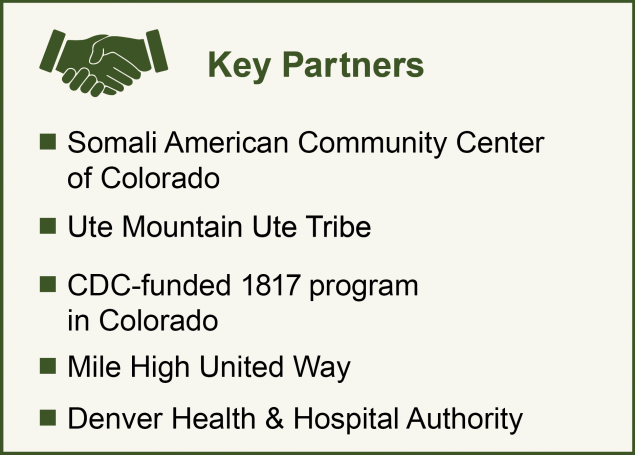Implementing Novel Approaches to Outreach and Bidirectional Referrals in Colorado
WISEWOMAN Innovation Spotlight

Colorado’s WISEWOMAN program implemented two distinct innovative strategies. For the first innovative strategy, Colorado partnered with organizations to conduct outreach to women in their communities and link them to WISEWOMAN services. Colorado began implementation at the beginning of the COVID public health emergency in 2020. Figure 1 displays COVID case rates and timing of public health protective measures as important context that influenced the recipient’s program implementation progress.
For the second strategy, Colorado facilitated bidirectional referrals between community programs and health care systems by contributing to a statewide inventory of referral resources and by helping WISEWOMAN clinics implement the Community Resource Inventory Service for Patient e-Referral (CRISPeR) platform [PDF – 801 KB], a bidirectional referral program.
- 2,185 women served, including 1,596 with a complete high blood pressure screening
- 86% of women identify as Hispanic, Black or African American, Asian or Pacific Islander, American Indian or Alaska Native, or multiracial
- 26% of women had hypertension at baseline screening
Source: Analysis of minimum data elements for women with a complete or high blood pressure screening in Years 1 and 2 (September 2018 to September 2020).
Notes: The national WISEWOMAN program defines hypertension as having an average systolic blood pressure of 140 mm Hg or higher, having an average diastolic blood pressure of 90 mm Hg or higher, or taking medication for high blood pressure.
How It Works
Strategy 1
For its first strategy, Colorado partnered with the Somali American Community Center and the Ute Mountain Ute Tribe to expand their existing outreach programs led by community health workers (CHWs) to include WISEWOMAN services.
Colorado provided technical support webinars, virtual meetings, and outreach funding for these partners, whose CHWs host educational events about cardiovascular health and the WISEWOMAN program for women in their communities.
The Ute Mountain Ute Tribe began planning its participation in this strategy before the COVID-19 public health emergency (PHE) began in March 2020 (see Key Partners box), building on the outreach and one-on-one support that its CHWs already used for other health services, such as cancer screenings. Other cardiovascular services are also offered for women who cannot be linked to a WISEWOMAN provider based on geography. The COVID-19 PHE limited the Ute Mountain Ute Tribe’s capacity and resources for this work.
In contrast, the Somali American Community Center began work on this strategy during the PHE. Its CHWs hosted virtual events, such as Zoom meetings, webinars, and WhatsApp text conversations focused on cardiovascular health and the WISEWOMAN program. Through this work, the CHWs identify women interested in WISEWOMAN and work with partners to provide any necessary supports, such as help scheduling a screening or finding transportation.
Strategy 2
For the second strategy, Colorado curates and cardiovascular health–related information to the statewide 2-1-1 referral resource database, which is funded primarily through CDC’s 1817 grant and operated by a group of nonprofit organizations.
The database is accessible to the public and any health system, including WISEWOMAN clinical provider sites. In addition, Colorado works with the CDC 1817 grant and WISEWOMAN clinics to implement the CRISPeR bidirectional referral platform.
CRISPeR pulls information from the 2-1-1 database to show providers a list of community organizations and other providers within the electronic health record to whom they can refer WISEWOMAN participants and share information securely. Those organizations reach out directly to participants to provide services and then follow up with the referring clinic to share participants’ progress and outcomes.
Colorado worked with two WISEWOMAN health systems to integrate CRISPeR into their existing electronic health record systems. As of May 2021, one site had received some training on CRISPeR, but the recipient was not yet using the system.
Clients who we have been able to screen are now on a better health path because they have a primary doctor who’s working with them. If anything [health related] comes up now, it’s being addressed…. Just being in the system [and] having a doctor to go to is a huge step in the right direction when it comes to women’s health.
Achievements to Date
Increased cardiovascular health education and screenings. Colorado reported that through the Somali American Community Center, about 300 people had received education about cardiovascular health as of April 2021. Of those, 17 women had attended a WISEWOMAN screening.
Improved access to health services. One partner respondent noted that when women from these communities choose to participate in WISEWOMAN, they are connected to the health care system, and this benefits their health beyond the WISEWOMAN services. For example, connection to health care professional can help participants receive referrals and treatment for health concerns that they might not otherwise raise or address.
More referral options for WISEWOMAN providers. Colorado’s cardiovascular health–related additions to the 2-1-1 database give providers more options for referring WISEWOMAN participants to needed services that could improve health outcomes.

This graph titled The COVID-19 Public Health Emergency in Colorado, charts the seven-day case rate per 100 thousand people, February 6, 2020, through May 31, 2021. From March 26 to April 26, 2020, local authorities were given discretion to encourage compliance with a statewide stay at home order. Case rate remained relatively flat, and well below 100, from February 6 to September 9, 2020, then peaked at 615 per 100 thousand by November 20. Case rates then declined to 214 per 100 thousand by April 2021. By May 31, 2021, case rates were at around 100. A statewide mask mandate ended May 14, 2021. Sources: Centers for Disease Control and Prevention’s COVID data tracker (accessed July 1, 2021) and National Academy for State Health Policy’s COVID-19 State Restrictions, Re-openings, and Mask Requirements.
Looking Ahead
Colorado’s WISEWOMAN program recipient aims to build new partnerships with other community organizations to continue to expand outreach efforts to women in underresourced communities.
Related Resources
References
- Centers for Disease Control and Prevention. COVID Data Tracker. Atlanta, GA: U.S. Department of Health and Human Services, CDC. Accessed July 1, 2021.
- National Academy for State Health Policy. 2020 COVID-19 State Restrictions, Re-openings, and Mask Requirements. Accessed July 1, 2021.


